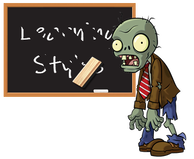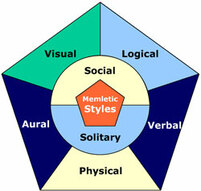 Why do some superstitions and myths linger? Is it because they have some kernel of truth that will help guide us through an uncertain and increasingly complex world? Or is it because they sound like an easy-to-understand truth, that explains life's complexities in a way that makes it easy for us to justify otherwise irrational actions? Always influencing our decisions, yet threatening to undermine our intentions because of their inherent lack of scientific merit? In the case of the concept of Learning Styles, I fear it is the latter option. The spectre of "learning styles," and its proclaimed "importance" as a consideration in instructional design, continues to loom over education systems -- despite well-informed entreaties to abandon the myth in favor of evidence-informed decision-making. I recently asked a group of graduate-level education students to draft position papers on their personal teaching philosophies with respect to the integration of educational technology. We had spent the first few weeks of the course discussing the core competencies of Instructional Designers, and exploring a range of key learning theories. Not once in the course readings were Learning Styles included as a fundamental concept. Yet... the concept has popped up in Tweets using the course hashtag, and in a number of students' teaching philosophy statements. I don't normally discuss Learning Styles in my courses, because they are not only unproven -- they are disproven. Corporal punishment was once also considered acceptable in schools. But -- unlike corporal punishment -- the myth of Learning Styles remains so pervasive in schools, colleges, and universities, that I feel I would be remiss if I didn't address it in some way. If the brilliant and creative educators whom I have the privilege of collaborating with every day are being affected by this insidious myth, then I feel I should at least give them some "food for thought" -- some fuel for a healthy debate, rather than letting blind acceptance of something that has been "debunked" continue unchecked. I am not a neuroscientist, and there are plenty of reputable authors who have commented on this topic more eloquently than I could... so I will not pontificate. I will summarize a few key points, and point to some of these excellent resources that every instructional designer, practicing educator, and education student should take the time to read. What is the Learning Styles Myth?As Donald Clark (2016) noted, Learning Styles are distillations of myriad learning theories into "simple models... which are simplistic, easy to learn, easy to put on a training Powerpoint slide, and easy to explain." They distill complex learning theories into simple categories of how students "learn best," focusing on their preferred modes of receiving and interacting with learning content. Learning-styles-online.com (n.d.) list the following seven categories, with which I'm certain most educators are familiar: What's Wrong with These Learning Styles?As Clark (2016) laments, "they are represented as researched, evidenced and science, when they are not." Clark has published a number of blog posts discussing the lack of science behind the Learning Styles myth and the reasons why it is still so (alarmingly) pervasive, which are well-worth reading:
Likewise, Steven Wheeler (2011) posted an excellent summary of what he called A Convenient Untruth. Some Key Points from Clark, Wheeler, and the many academic sources they cite (which include both neuroscientists and educational researchers):
The gist of a recent Tweet by one of my graduate education students (while sharing a link to an article from Forbes (McCue, 2019) espousing the importance of Learning Styles) was that incorporating them into instructional decision-making helps more students to achieve learning goals, because we'll hit more of their preferred "styles." Without getting into too much science -- targeting Learning Styles preferences should not be the focus. But, there is evidence-based merit to incorporate a variety of teaching and learning approaches. Such variety increases engagement, because it reduces the "normalization" of instructional presentation. In other words, it prevents desensitization to the presentation format. It also peaks learners' interest -- ALL learners, not just those who prefer one "style" over another. Boredom can take students out of the engagement zone talked about in Flow theory (Learning-theories.com, n.d.)! Then, there's also the benefit of multi-modal, or multi-channel reception of content (Mareno & Mayer, 2000; Quinette, et al., 2003; Zheng, 2009) . Evidence has shown that information presented through multiple modes -- targeting multiple senses -- is better understood, and better encoded into long-term memory. Long story short -- there are plenty of valid, rigorously tested learning theories and models that we should be considering when making instructional design decisions. There are plenty of reasons to incorporate variety in how we present material, and expect our students to interact with it. There is not only NO need to rely upon over-simplified models that sound good (but lack evidence) -- reliance on such models leads us astray from informed decision-making (and potentially risks us making harmful instructional decisions). ReferencesClark, D. (2010, February 15). Learning Styles - final nail in coffin? [Web log post]. Donald Clark: Plan B. Available from http://donaldclarkplanb.blogspot.com/2010/02/learning-styles-final-nail-in-coffin.html
Clark, D. (2016, October 8). 7 reasons why teachers believe, wrongly, in ‘Learning Styles.' [Web log post]. Donald Clark: Plan B. Available from http://donaldclarkplanb.blogspot.com/2016/10/7-reasons-why-teachers-believe-wrongly.html Clark, D. (2018, June 16). University faculty believe in Learning Styles and promote it to students while their Teacher Training departments say it's a myth. [Web log post]. Donald Clark: Plan B. Available from http://donaldclarkplanb.blogspot.com/2018/06/university-faculty-believe-in-learning.html ClipartXtras (n.d.). Chalkboard. [Image file]. Available from https://clipartxtras.com/categories/view/de245518959d7fb4318c464ae3016506010232ea/chalkboard-clipart-transparent.html Kisspng (2019). Chalkboard eraser. [Image file]. Available from https://www.kisspng.com/png-chalkboard-eraser-blackboard-sidewalk-chalk-2228618/download-png.html Learning Styles Online (n.d.) Overview of Learning Styles. [Web page]. Available from https://www.learning-styles-online.com/overview/ Learning-theories.com (n.d.) Flow (Csíkszentmihályi). [Web page]. Available from https://www.learning-theories.com/flow-csikszentmihalyi.html Mareno, R. & Mayer, R. E. (2000). A learner-centered approach to multimedia explanations: Deriving Instructional Design principles from Cognitive Theory. Interactive Multimedia Electronic Journal of Computer-Enhanced Learning, 2(2). http://imej.wfu.edu/articles/2000/2/05/index.asp McCue, T.J. (2019, January 30). How Combined Learning Style Not Just Visual Or Kinesthetic Can Help You Succeed. [Web log post]. Forbes. Available from https://www.forbes.com/sites/tjmccue/2019/01/30/how-combined-learning-style-not-just-visual-or-kinesthetic-can-help-you-succeed/#5f329857d9cc PlusPNG (2019). Regular Zombie. [image file]. Available from http://pluspng.com/png-7866.html Quinette, P., Guillery, B., Desgranges, B., de la Sayette, V., Viader, F., & Eustache, F. (2003). Working memory and executive functions in transient global amnesia. Brain 126(9), 1917-1934. Available from https://doi.org/10.1093/brain/awg201 Wheeler, S. (2011, November 24). A convenient untruth. [Web log post]. Learning with 'e's. Available from http://www.steve-wheeler.co.uk/2011/11/convenient-untruth.html Zheng, R. Z. (2009). Cognitive effects of multimedia learning. [PDF file]. Hershey, PA: Information Science Reference. http://www.sci.sdsu.edu/CRMSE/personal_pages/sreed/Manipulating_Materials.pdf
1 Comment
|
AuthorRob Power, EdD, is an Assistant Professor of Education, an instructional developer, and educational technology, mLearning, and open, blended, and distributed learning specialist. Recent PostsCategories
All
Archives
June 2024
Older Posts from the xPat_Letters Blog
|


 RSS Feed
RSS Feed